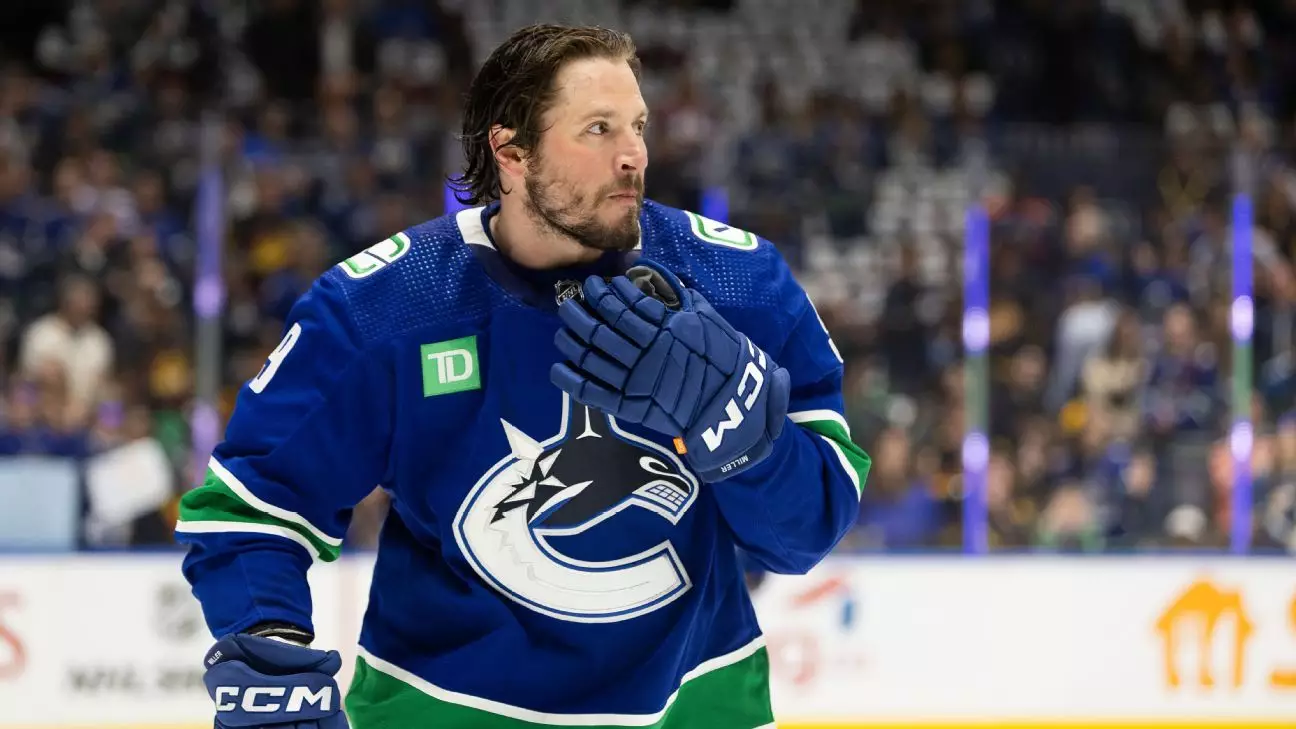The Vancouver Canucks have been no stranger to drama during the current NHL season, and recent events have only added to the swirling chaos. General Manager Patrik Allvin’s recent comments, particularly regarding the near-trade of forward J.T. Miller to the New York Rangers, highlight the complex dynamics at play within this struggling team. These revelations have not only raised eyebrows but also sparked wider discussions about the team’s future and its current roster composition.
Reports surfaced that the Canucks contemplated trading Miller, a key player since the 2019-20 season, to the Rangers. This discussion was significant enough that there were considerations about keeping him out of a game against the Edmonton Oilers, showcasing the high stakes involved. Such strategic moves indicate a severe level of introspection from the Canucks’ management as they seek to recalibrate their season following a disappointing start. Miller, who was drafted 15th overall by the Rangers in 2011, has had a storied career that includes being Vancouver’s leading scorer last season with 103 points. However, his fluctuating performance this season, with 31 points in 35 games, adds to the narrative of uncertainty and potential upheaval within the squad.
Allvin, when pressed for details, remained evasive. His comments suggest a broader philosophy of exploration for improvement within the team, emphasizing a commitment to competitive enhancement rather than specific vendettas or grudges. This reluctance to reveal the inner workings of the trade talks calls into question whether the Canucks have a clear strategic direction in mind or are simply reacting to their deteriorating performance.
Adding another layer of complexity to the situation is J.T. Miller’s reported strained relationship with fellow star, Elias Pettersson. The background to this friction appears to stem from issues surrounding on-ice chemistry and perhaps, more revealingly, personality clashes. Former Canucks coach Bruce Boudreau acknowledged that the discord predated his tenure, implying that the roots of the problem are deep-seated and not easily resolved, posing a severe challenge for the team’s cohesion moving forward.
The public nature of their disagreements, including instances where Miller reportedly called Pettersson a “baby,” has put additional pressure on Allvin and the coaching staff to navigate these personal rifts judiciously. Captain Quinn Hughes has also referenced the underlying issues, but both players have downplayed the notion of a feud, which complicates the narrative even further. In an environment where every word is scrutinized, the ability of players to deny interpersonal strife becomes essential for maintaining team morale.
Rick Tocchet, who has been at the helm this season, finds himself in a precarious position. While the Canucks meet scrutiny for their on-ice performance and the turbulence off it, Tocchet’s leadership style has garnered praise from Allvin. The relationship between a coach and his players is paramount, particularly in high-pressure environments, and it seems Tocchet has fostered a degree of resilience within the squad amidst the maelstrom of trade rumors and player tensions.
Allvin reiterated his support for Tocchet, suggesting there is room for his style to stay long-term with the team. Nevertheless, the looming question of whether Tocchet himself wishes to continue beyond this season casts a shadow over the Canucks’ future direction. The potential for a club option for the 2025-26 season signals the management’s belief in continuity, though the ultimate decision should ideally involve conversations with Tocchet about his visions for the team.
Despite the challenges and uncertainties, Allvin remains optimistic about the Canucks’ core and their playoff potential. His statements highlight the need to filter external distractions—such as trade rumors and personal rivalries—to cultivate a team environment conducive to performance. Focusing on nurturing trust and camaraderie within the locker room will be essential as the Canucks press forward.
Yet, as the season progresses, it is evident that the Canucks must confront these underlying issues head-on. Whether it is addressing player tensions, strategizing better on the ice, or refining their personnel decisions, the path ahead requires astute management and unwavering determination to return to competitiveness in the ever-dynamic landscape of the NHL. The immediate ramifications of recent trade discussions will likely echo in the team’s performance as they seek cohesion and clarity in a time of transition.


Leave a Reply